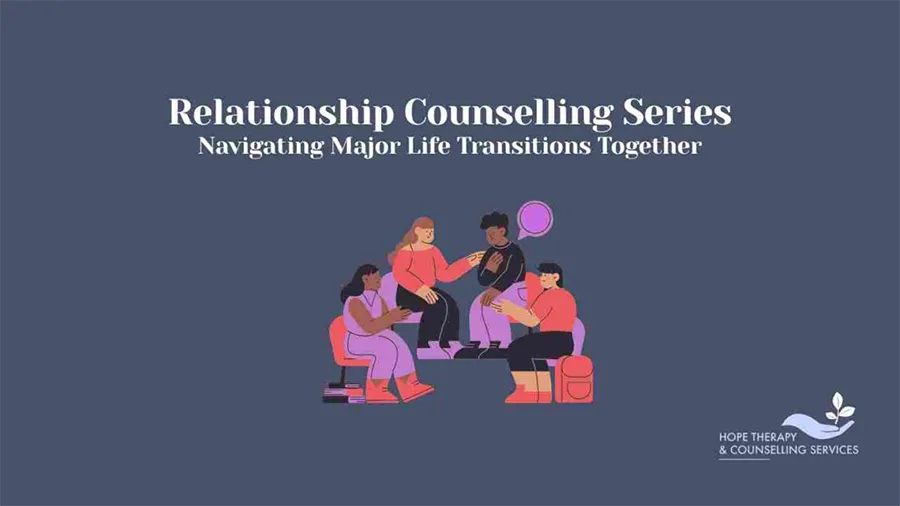Life is full of transitions—some planned, others unexpected. Marriage, parenthood, career changes, moving house, retirement, illness, bereavement. Each of these moments can bring excitement and growth, but also uncertainty, stress, and emotional upheaval. For couples, these major life events don’t just affect the individual; they reshape the dynamic of the relationship itself. Navigating these changes together takes conscious effort, mutual support, and often, outside guidance.
It’s not unusual for life transitions to bring hidden stressors to the surface. Even positive changes, like getting married or having a baby, can disrupt established routines and introduce new roles and expectations. Suddenly, the way you communicate, divide responsibilities, or express affection might feel different. One partner may embrace the change with enthusiasm, while the other feels anxious or overwhelmed. If those differences aren’t acknowledged and discussed, resentment and emotional distance can creep in.
Similarly, unexpected transitions—like job loss, a sudden illness, or the death of a parent—can throw a couple into crisis mode. Emotions may run high, and partners may find themselves reacting rather than connecting. In such times, the strength of the relationship is often tested. Some couples draw closer through adversity, but many others find that stress exposes long-standing cracks in communication, trust, or emotional intimacy.
At Hope Therapy & Counselling Services, we often work with couples facing just these kinds of challenges. We understand that life doesn’t pause for you to catch your breath—and that the pressure of navigating change can feel isolating. Many couples come to therapy not because they’ve stopped loving each other, but because they’ve stopped feeling like a team. Our goal is to help them rediscover that sense of partnership.
One of the first steps in navigating a major life transition is acknowledging the emotional impact it’s having on each partner. Often, we assume that we’re coping “well enough”—but underneath, we might be feeling grief, fear, anger, or confusion. Counselling creates a space where these feelings can be safely explored and understood. It’s okay to feel differently about the same event. What matters is that you’re willing to listen to each other and validate those differences.
Take retirement, for example. For one partner, it might feel like a long-awaited break and a chance to slow down. For the other, it might represent a loss of identity or purpose. If those experiences aren’t shared, one person may feel frustrated at their partner’s reluctance to ‘enjoy’ the change, while the other feels pressured to pretend they’re fine. Therapy encourages honest dialogue about these experiences, helping both partners feel seen and supported.
Transitions also bring about shifts in roles. New parents may struggle with the sudden loss of spontaneity, sleep, or intimacy. A partner who was once focused on career might now feel pulled toward caregiving, or vice versa. This can unsettle long-standing patterns and create new tensions. Counselling helps couples re-negotiate their roles with intention, rather than falling into resentment or imbalance. It’s about choosing the partnership again in light of new circumstances.
Financial pressure is another common stressor during transitions. Whether it’s saving for a house, managing student loans, or adjusting to a single income, money concerns can intensify emotional strain. Often, couples have different attitudes toward spending, saving, or financial security. These attitudes are shaped by upbringing and personal experience, and they don’t always align. Through therapy, couples can learn how to talk about money in a way that fosters collaboration rather than conflict.
In moments of grief or illness, emotional needs can become particularly complex. One partner may withdraw into silence, while the other desperately wants connection. Or both may be so focused on practical survival that emotional support falls by the wayside. Counselling helps couples stay emotionally present with each other during hardship—not by solving the problem, but by facing it together. That sense of togetherness can be profoundly healing in itself.
Major transitions can also reignite past wounds or insecurities. A move to a new city might bring up fears of abandonment. Becoming a parent may trigger unresolved issues from one’s own childhood. Retirement may highlight anxieties about ageing or mortality. These deeper layers of emotion can influence the way we show up in our relationships, often without us realising it. A skilled therapist can help bring these patterns into awareness so they can be worked through, rather than repeated.
Couples therapy is not just for ‘fixing’ problems; it’s also a proactive way to strengthen resilience. Just as people prepare for a marathon with physical training, relationships benefit from emotional preparation. Therapy offers tools to help couples communicate more clearly, handle conflict more constructively, and maintain emotional closeness—even when external circumstances are shifting.
Some of the most powerful work in therapy happens when couples begin to ask: “How can we support each other through this?” rather than “Why aren’t you dealing with this better?” That shift in perspective can transform tension into teamwork. It’s about cultivating empathy, curiosity, and patience—not just with your partner, but with yourself.
At Hope Therapy & Counselling Services, we support couples through every stage of life. We know that transitions can feel like unfamiliar terrain—but you don’t have to walk it alone. With the right support, couples can emerge from these experiences stronger, wiser, and more connected than before.
If you and your partner are facing a major life change—whether joyful, difficult, or somewhere in between—therapy can help you navigate it with compassion and care. You are not expected to have all the answers. What matters is your willingness to show up, talk openly, and choose the relationship again, even when the landscape changes. Together, you can write the next chapter of your story with intention and hope.

